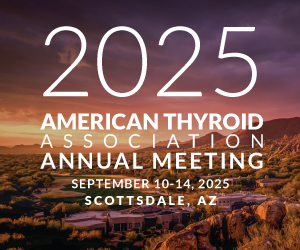Studies Focus on Genetic Variation Associated with Thyroid Tumors and Links To Drug Resistance
Two young clinical scientists were awarded grants by ThyCa: Thyroid Cancer Survivors’ Association, Inc. (ThyCa) and the American Thyroid Association (ATA) beginning in 2013 to fund research projects aimed at identifying genetic changes that increase risk for thyroid cancer and understanding how thyroid tumors develop resistance to anticancer drugs. The ATA Research committee has recently reviewed their progress and approved funding for the second year grant.
 Jaroslaw Piotr Jendrzejewski, MD, PhD, a researcher at Ohio State University, Columbus, is focusing on genetic variations that predispose individuals to develop thyroid cancer. Two sites of genetic variation located on the same region of chromosome 14 have been linked with an increased risk of developing papillary thyroid carcinoma (PTC), but the precise DNA mutations are not known. Dr. Jendrzejewski is using a combination of second-generation DNA sequencing and advanced bioinformatics to discover novel genetic changes within these regions. The grant proposal “Analysis of Locus 14q13.3 in Search of Mutations Predisposing to Papillary Thyroid Carcinoma (PTC)” describes his two-step approach for identifying genetic variants and then ranking them according to how commonly they are present in PTC and control samples. Bio
Jaroslaw Piotr Jendrzejewski, MD, PhD, a researcher at Ohio State University, Columbus, is focusing on genetic variations that predispose individuals to develop thyroid cancer. Two sites of genetic variation located on the same region of chromosome 14 have been linked with an increased risk of developing papillary thyroid carcinoma (PTC), but the precise DNA mutations are not known. Dr. Jendrzejewski is using a combination of second-generation DNA sequencing and advanced bioinformatics to discover novel genetic changes within these regions. The grant proposal “Analysis of Locus 14q13.3 in Search of Mutations Predisposing to Papillary Thyroid Carcinoma (PTC)” describes his two-step approach for identifying genetic variants and then ranking them according to how commonly they are present in PTC and control samples. Bio
 The research proposal “Overcoming Resistance to RET Inhibitors in Medullary Thyroid Cancer,” received an ATA grant awarded to principal investigator Nicole G. Chau, MD, a medical oncologist at the Dana-Farber Cancer Institute/Brigham and Women’s Hospital, Boston, MA. The new FDA-approved tyrosine kinase inhibitor drugs that target RET kinase to treat medullary thyroid cancer (MTC)—such as vandetanib—do not appear to improve patient survival substantially, and the tumors ultimately develop drug resistance. Patients with certain specific mutations in the RET kinase gene have a better drug response. Dr. Chau will compare current and novel RET inhibitors against MTC cells that have different RET mutations to define and predict resistance mechanisms. Bio
The research proposal “Overcoming Resistance to RET Inhibitors in Medullary Thyroid Cancer,” received an ATA grant awarded to principal investigator Nicole G. Chau, MD, a medical oncologist at the Dana-Farber Cancer Institute/Brigham and Women’s Hospital, Boston, MA. The new FDA-approved tyrosine kinase inhibitor drugs that target RET kinase to treat medullary thyroid cancer (MTC)—such as vandetanib—do not appear to improve patient survival substantially, and the tumors ultimately develop drug resistance. Patients with certain specific mutations in the RET kinase gene have a better drug response. Dr. Chau will compare current and novel RET inhibitors against MTC cells that have different RET mutations to define and predict resistance mechanisms. Bio
“These two projects are highly significant,” says Sissy M. Jhiang, PhD, Professor, Ohio State University College of Medicine, Columbus. “Dr. Chau’s study may provide evidence-based guidance in matching the most effective drug for each individual MTC patient. In addition, drug resistance may be overcome by novel strategies to ensure lasting therapeutic efficacy. Equally important, Dr. Jendrzejewski aims to identify genetic changes that put individuals ‘at risk’ in developing thyroid cancer, such that genetic testing may lead to early diagnosis and disease intervention,” says Dr. Jhiang.



